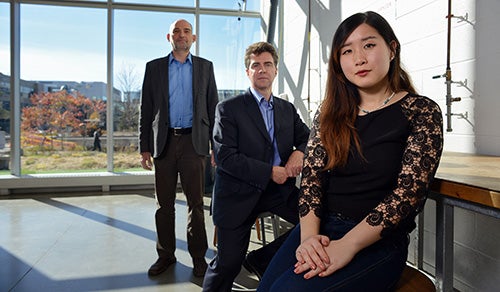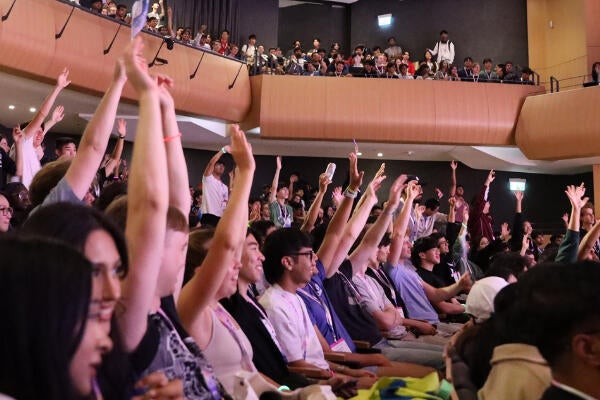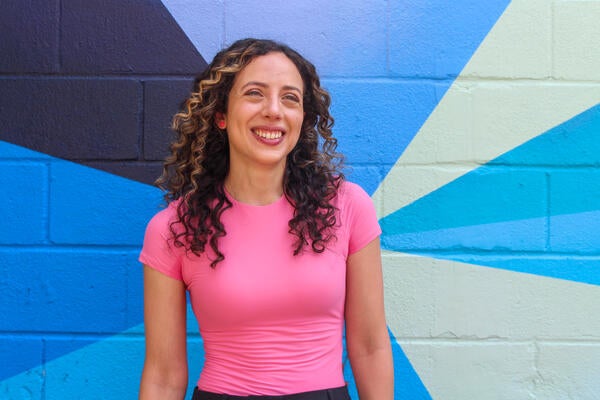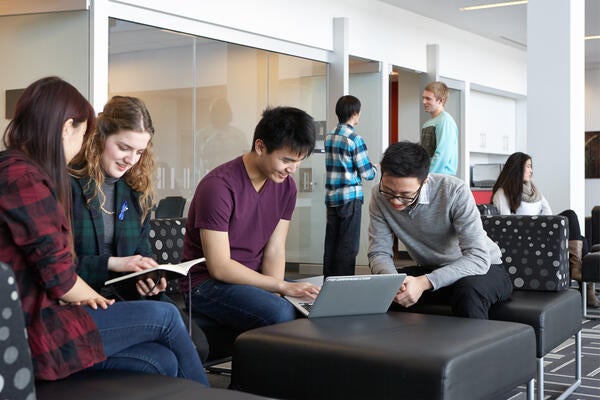
Case studies: A bridge between co-op and the classroom
Waterloo Engineering has the world’s largest library of case studies for real-world learning

Waterloo Engineering has the world’s largest library of case studies for real-world learning
By Heather Bean Marketing and Strategic Communications
Steve Lambert, Jeff Chambers and Lilly Zheng
When Steve Lambert rejoined Waterloo Engineering as a professor he recalled his time as a student and the gap he felt between the conceptual learning of the classroom and the real-world work of a co-op term. He envisioned one method of bridging this gap, and he saw that engineering co-op students themselves could provide it—by turning their work term reports into case studies.
That was the genesis of Waterloo Cases in Design Engineering (WCDE), now the world’s largest library of engineering case studies. Lambert used a Natural Sciences and Engineering Research Council of Canada (NSERC) Chair in Design Engineering grant to develop the infrastructure to make the case method a viable and sustainable option in engineering education.
Jeff Chambers, a principal engineer at AMEC Foster Wheeler, has been a member of WCDE’s Industry Advisory Committee (IAC) since it was founded in 2005. And back when the program was being established, he says “one of the common messages you got from industry was ‘you build up these great students, but they’ve learned to learn in very structured ways and, in the real world, you don’t have problems served to you that way.’ ”
The case study method of teaching offers the nuance and complexity that textbook problems lack, argues Lambert. In the case study method, teachers present students with real-life, open-ended engineering problems—how to improve the manufacturing process for the next generation of digital industrial cameras, for instance—but don’t offer clearly defined methods of analysis. Students need to figure out which tools to use and what data might be missing—like a working engineer.
“There’s an expression we use as teachers, that we ‘cover subjects,’” Lambert says. “When I started using case studies, my thinking shifted from subject coverage to figuring out what the students are really grasping, and how much material they could really digest. It made me focus more on deeper learning.”
Chambers has seen this deeper learning happening in Waterloo’s engineering classrooms.
“To watch students in a lecture environment, doodling, and then watching them in a case environment, where pretty much across the board they’re all paying attention, they’re leaning into the conversation—that says a lot.”
Using students’ work term reports as a primary source of case studies means the WCDE’s library is constantly refreshed with current issues in engineering.
“More than a thousand work term reports are generated every term,” Lambert notes. “It’s a very rich and varied resource for the study of different applications of engineering.” About two thirds of the library’s holdings come from work reports: WCDE converts the reports into case studies, but also pays students that make the cut $1,000 for converting their own reports into case studies.
Teachers use the case studies to develop teaching tools ranging from quizzes and in-lecture exercises to major projects and exams. Today, it’s likely that every Waterloo Engineering grad will encounter the case study method at some point in his or her degree.
Lilly Zheng (BASc Electrical Engineering 2014) is currently completing a Master’s in Electrical Engineering at Waterloo and says she benefited from the case study method.
“Case studies have definitely improved my problem-solving skills. With engineering, problems are never really cut and dried. You have to weigh not only the effectiveness of a certain solution but also factors like resources, costs, time—and all those factors come together to make a final solution. There’s no formula. That’s the skill set students get to practice with case studies.”
Zheng also observes that bringing case studies to classrooms can help students think more deeply about their co-op term as a learning experience. “When you’re in the middle of a job, maybe some of your tasks seem a little more day to day.… But then when you write the work term report, that experience helps you see which of the problems you did encounter might be significant.”
When they graduate, Waterloo students may find their experience with case studies will help them with the job search as well. Chambers notes that, as a manager, his experience working with WCDE has affected his hiring practices: he often presents candidates with a case study to discuss. He’s looking not just for knowledge, but for the capacity to learn and to be comfortable with uncertainty. Waterloo’s Engineering students should be well prepared for that interview.

Read more
Hackers find inspiration, invention and community at the weekend-long Hack the North event

Read more
How Waterloo grad and muralist Stephanie Boutari learned to trust her gut and follow her art

Read more
Six Loran Scholars will begin their studies at Waterloo this fall in the faculties of Engineering, Mathematics and Science
The University of Waterloo acknowledges that much of our work takes place on the traditional territory of the Neutral, Anishinaabeg, and Haudenosaunee peoples. Our main campus is situated on the Haldimand Tract, the land granted to the Six Nations that includes six miles on each side of the Grand River. Our active work toward reconciliation takes place across our campuses through research, learning, teaching, and community building, and is co-ordinated within the Office of Indigenous Relations.